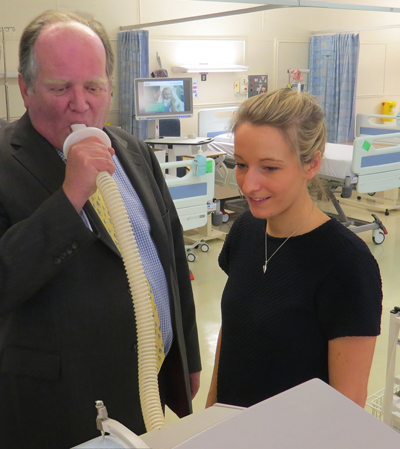 A new group of medications has been enabling patients with some of the most serious forms of asthma to enjoy a better quality of life.
A new group of medications has been enabling patients with some of the most serious forms of asthma to enjoy a better quality of life.
Biologics work by targeting and blocking specific parts of the immune system that are involved in allergic reactions and asthma symptoms.
This year the respiratory team at Royal Brompton began using these medications to give patients an option that does not involve high-dose steroids - which can have unpleasant side-effects.
While not suitable for all patients, those who have been able to move onto these drugs have reported reduced breathlessness and an ability to be much more active.
Professor Andrew Menzies-Gow, consultant physician and respiratory division clinical director, led the introduction of biologics at the Trust. He said: "For many years, high-dose steroids were the only real option for managing severe asthma symptoms, so biologics have been a significant breakthrough.
"Patients for whom this medication is suitable have reported significant improvements in their quality of life, and as this young family of medication develops further and new variants become available, we're hopeful that many more of our patients will be able to benefit."
"For many years, high-dose steroids were the only real option for managing severe asthma symptoms, so biologics have been a significant breakthrough."
Professor Andrew Menzies-Gow
 Simon Harding-Rolls developed late-onset asthma in 2003 and was eager to find out if he was suitable for treatment with biologics.
Simon Harding-Rolls developed late-onset asthma in 2003 and was eager to find out if he was suitable for treatment with biologics.
He said: "I've been on daily steroids since 2005 and they have lots of side-effects: the most serious I've had was steroid-induced diabetes. I'm grateful for the treatment - without it, I would probably be dead - but your quality of life is majorly affected by it.
"Asthma does make you old before your time. I used to go skiing and throw myself down every slope known to man, but now I can't even get up a mountain. My 13-year-old son knows that when we go to the park 'daddy doesn't run'.
"I'd been aware of biologics for some time. I wanted to join the trials for them but couldn't, which was quite a blow, but as soon as they became available I went for it - and it's made a tremendous difference."
Simon is prescribed a biologic called Mepolizumab (Mepo), which is administered via injection during an outpatient appointment at Royal Brompton. As well as having improved overall lung function, Simon has not experienced any acute periods of illness since being on Mepo, which he says previously used to happen two or three times a year.
He said: "I can do far more than I used to be able to do. I can now jump off a train at Waterloo and walk into the city from there if I want to. In that sense, Mepo has been a game changer."
< Trust experts help shape the future of respiratory medicine
